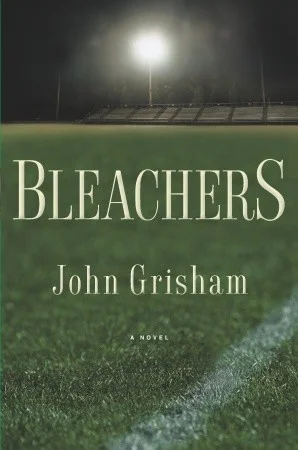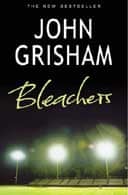Introduction
Bleachers Summary And Themes By John Grisham Famous for his legal thrillers, John Grisham takes a different approach in Bleachers (2003), a book that moves away from the courtroom action to examine themes of time passing, sadness, and nostalgia. Bleachers, which is set in the small, made-up town of Messina, Mississippi, centers on the reunion of former high school football players and their thoughts on their previous life, especially the influence of their late coach, Eddie Rake. The book explores how our identities are shaped by formative experiences and how we deal with the ghosts of our pasts in a very emotional and introspective way.
The cultural importance of high school athletics in small-town America is depicted by Grisham in Bleachers, along with how the characters are united by this common experience. The work addresses issues of love, loss, and the difficulties of accepting unresolved feelings through a straightforward but moving story. Grisham looks at how the good old days of adolescence can seem far away and illusive, and how the individuals who used to play important roles in our lives—like a coach we loved or a friend we lost—are remembered and misinterpreted. The characters face their own complex relationships with the past as the drama takes place in real time over one summer evening, but they eventually come to accept forgiveness and go on.
Plot Summary
1. The Return to Messina
A group of former high school football players return to Messina to honor Coach Eddie Rake, who has gone away, at the beginning of the book. Rake, a legendary coach who controlled the town’s football scene for decades, was known for his tough, authoritarian techniques as well as for encouraging greatness in his players. Former players’ reunion at Rake’s funeral initiates a process that requires them to consider their past, their lives after high school, and their lasting emotions for their coach.
The main character of the book, Neely Crenshaw, is one of these former athletes. Once the standout quarterback for the Messina High School football team, Neely’s identity and career were centered around his football accomplishments. Time has, however, left Neely feeling lost and disillusioned because he was never able to realize his previous aspirations of becoming a famous person. Neely is overcome with mixed feelings when he returns to Messina: longing for his heyday on the field, resentment at his coach’s harshness, and a profound sense of guilt and unresolved anguish over the passing of his father and the unsolved problems he had with Coach Rake.
The history of the town is reenacted as Neely and the other former players assemble in the bleachers, where they used to sit and watch their football dreams come true. Grisham gradually reveals each character’s personal hardships and how the experiences of their early years have influenced their present lives via their dialogue and introspection.
2. Neely’s Reflection on His Past
At the heart of Bleachers is Neely’s emotional journey as he reflects on his life both before and after his high school days. His rise to prominence on the football field was a defining part of his youth, but it also became a source of disappointment and loss. Neely’s father, who had always been a significant influence on him, died suddenly during Neely’s high school career, and this event left a deep mark on Neely’s psyche. He never had the opportunity to reconcile with his father, and his relationship with Coach Rake became strained as a result.
Neely’s tumultuous relationship with Rake is a central theme in the novel. Rake was a complex figure—both a mentor and a tyrant. He pushed his players to their limits and instilled in them a sense of discipline, but he also demanded perfection, sometimes at the expense of his players’ emotional well-being. Neely was deeply affected by Rake’s tough love, and his own feelings toward the coach are conflicted. On one hand, Neely feels betrayed and hurt by the coach’s harsh methods, but on the other hand, he acknowledges that Rake’s influence helped shape him into the man he became. Neely’s internal battle with his emotions towards Rake represents the larger theme of the novel—the complexities of love, authority, and reconciliation.
As Neely sits in the bleachers, surrounded by former teammates who also grapple with their own complicated feelings toward Rake, he begins to come to terms with his own unresolved grief and anger. His reflections on his past force him to confront not only his relationship with Coach Rake but also his sense of personal failure and the choices he made after high school that led him down a different path from the one he once envisioned.
Read more
3. The Legacy of Coach Eddie Rake
Coach Eddie Rake is a shadow that looms over the entire novel. Though he has passed away before the events of the story, his presence is felt throughout the book. As the former players gather to remember him, they recount their experiences with the coach, revealing how his influence shaped their lives both on and off the field. While many of them look back on their time with Rake with resentment, others still view him as a hero. The coach’s legacy is complex and multifaceted. He was a man who demanded loyalty, discipline, and sacrifice, and for some, he was a figure of authority and guidance. For others, his methods left deep emotional scars.
Rake’s relationship with Neely, in particular, is fraught with tension. Neely was the star quarterback of Rake’s team, and while their relationship initially seemed like one of mutual respect, it became strained after Neely’s father’s death. Neely’s struggle with his father’s passing and the pressure to live up to Rake’s expectations led to his eventual departure from football and a sense of lost potential.
As the former players gather in the bleachers, they come to realize that Rake’s legacy, while controversial, shaped them in ways they hadn’t fully understood. Some of them resent the pressure he placed on them, while others view him as a father figure. The reconciliation with Rake’s memory becomes a crucial part of Neely’s emotional journey, as he learns to forgive the coach for his shortcomings and appreciate the lessons he imparted.

4. The Bleachers as a Symbol
The bleachers in Bleachers are not only a literal location but also serve as a symbolic space where the characters confront their past and come to terms with their personal histories. For Neely and the other former players, the bleachers represent a time when life was simpler, and their futures seemed filled with limitless potential. Sitting in the bleachers, they are transported back to their youth, but they are also faced with the reality of how time has changed them. The bleachers, once a place of triumph and glory, are now a place of reflection and regret.
The bleachers also symbolize the passage of time and the fleeting nature of life. As Neely and his friends watch the younger generation play football on the field below, they realize that their own time has passed. They are no longer the young men who once dominated the field, and the game they loved is now something of the past. This theme of the inevitability of time and the struggles of aging is a key part of the novel’s emotional weight.
5. The Town of Messina and its Role
The town of Messina is a character in and of itself, not only a setting for the narrative. The town has a long history of football, and Coach Rake’s legacy is well ingrained in the local culture. Messina is a place that Neely and his pals have attempted to flee from as well as a place that they consider home. They are faced with the ways that their lives have changed and the ways that they have stayed the same as they make their way back to the town for Rake’s burial. The past haunts Messina, and the characters have to make peace with the town’s past while living in the present.
Themes in Bleachers
1 Nostalgia and the Past: A major theme in Bleachers is the role of nostalgia in shaping our identities. The novel explores the idea that our past experiences, especially those from our youth, remain with us and often define who we are. For Neely and the other former players, their time on the football field represents a golden era of their lives, and the return to the bleachers serves as a reminder of both their triumphs and their regrets.
2 Grief and Loss: Bleachers is a novel about grief—not only the grief of losing a loved one but also the grief that comes with missed opportunities and unfulfilled potential. Neely’s struggle with the death of his father and his unresolved relationship with Coach Rake reflects the novel’s larger meditation on the emotional wounds that remain long after the loss has occurred.
3 Forgiveness and Redemption: Another central theme is forgiveness. Neely’s journey is one of coming to terms with his past, learning to forgive himself for the choices he made, and finding peace with the people who shaped his life. This theme is most evident in his relationship with Coach Rake, as Neely learns to forgive Rake for his mistakes and appreciate the ways in which the coach’s tough love shaped him as a person.
Read more
4 The Passage of Time: The novel poignantly explores the passage of time and how it changes people. The former football players, who once believed they had all the time in the world, are now confronted with the reality that they have aged, their glory days are behind them, and their lives have taken paths they didn’t anticipate. Time has a way of slipping away, and the characters must come to terms with how they’ve spent it.

5 Small-Town Life: The town of Messina represents small-town America, where sports, tradition, and community are deeply ingrained in the culture. The town’s obsession with football and Coach Rake highlights the power of shared experiences and the way in which a small-town identity is shaped by its heroes, its values, and its collective memory.
Read more
(FAQ)
1. What is the central theme of Bleachers?
The central theme of Bleachers is the power of the past and how it shapes our present lives. The novel explores themes of nostalgia, grief, and forgiveness, as the characters reflect on their youth, confront their unresolved emotions, and come to terms with the choices they’ve made.
2. Who is the main character in Bleachers?
The main character is Neely Crenshaw, a former high school football star who returns to his hometown for the funeral of his former coach, Eddie Rake. Neely is forced to reflect on his past and confront unresolved grief and regrets.
3. What is the significance of the bleachers in the novel?
The bleachers are a symbolic location in the novel, representing both a literal space where the characters once watched football games and a metaphorical space where they reflect on their pasts. The bleachers are a place of nostalgia, regret, and the passage of time.
4. How does Bleachers differ from Grisham’s other novels?
Bleachers differs from John Grisham’s usual legal thrillers by focusing on a small-town football community and exploring more personal, introspective themes. It is a slower-paced, emotional exploration of relationships, memory, and personal redemption rather than a fast-paced legal drama.
5. What role does Coach Rake play in the novel?
Coach Eddie Rake is a central figure in the lives of the former players. Though he has passed away before the events of the novel, his legacy is still very much alive. He was both a mentor and a tyrant, and the novel explores the complex impact he had on his players’ lives. Neely’s relationship with Rake, in particular, is key to the novel’s exploration of forgiveness and coming to terms with the past.
Read more
















